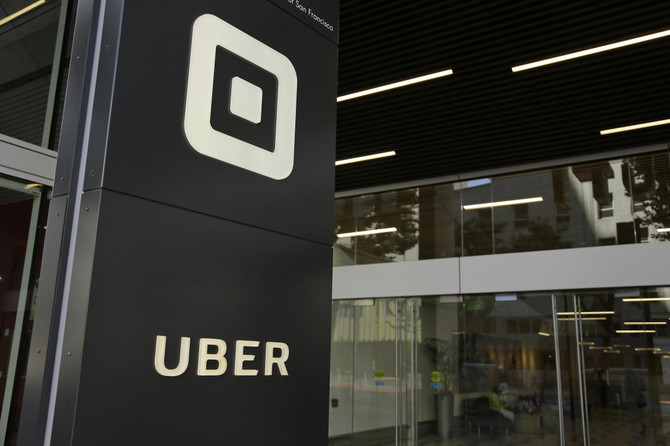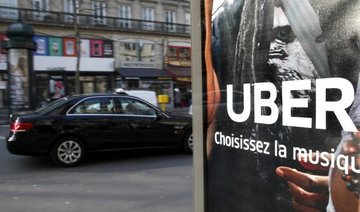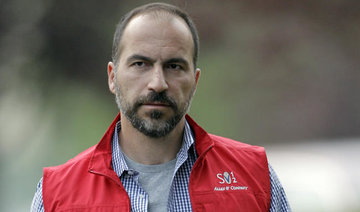SAN FRANCISCO: Uber CEO Dara Khosrowshahi is focused on cutting the company’s massive losses and “getting the love back” after a year of damaging revelations about the ride-hailing service’s sometimes heartless treatment of its employees, drivers, regulators and rivals.
“We strive to be and should be a brand that is as beloved as Amazon and Google,” Khosrowshahi said late Wednesday during an appearance at a Goldman Sachs technology conference. “We have a long way to go, but we have to re-earn our consumer and driver trust. Just getting the love back is a very important priority for us.”
The job is proving to be even more difficult than Khosrowshahi anticipated five months ago after Uber lured him away from online travel agency Expedia to replace its embattled co-founder, Travis Kalanick, as CEO.
Khosrowshahi inherited a mess after Uber acknowledged rampant sexual harassment within its ranks and its use of duplicitous software to thwart government regulators while dealing with the fallout from a video that captured Kalanick berating one of its own drivers.
To make matters worse, Khosrowshahi discovered that Uber had covered up a computer break-in that stole personal information about millions of riders and drivers. He also landed in the midst of a court battle that pitted Uber against a Google spinoff alleging that the ride-hailing service had conspired to steal its self-driving car technology while Kalanick was running things.
“It looked messy and it was messy,” Khosrowshahi said.
As part of the cleanup, Uber last week agreed to pay $245 million to settle the trade secrets case brought by Waymo, the company spawned by a self-driving car project started by Google. The settlement came after four days of trial testimony that included a dramatic appearance by Kalanick, who fended off accusations of orchestrating a elaborate high-tech heist during more than two hours on the witness stand.
“I thought Travis was terrific,” Khosrowshahi said. “I thought he really held up well, and spoke his mind. I think that helped us get to the settlement.”
Uber didn’t acknowledge any wrongdoing in the settlement that gave Waymo’s corporate parent, Alphabet Inc., more stock in the ride-hailing service. Google, which is also owned by Alphabet, had already accumulated Uber stock as one of the company’s early investors.
Alphabet and other investors stand to reap big gains on their stakes if Uber files for an initial public offering of stock next year, as Khosrowshahi plans. But how well Uber’s stock fares on Wall Street will likely be tied to whether the company proves it can make money — something it isn’t close to doing now.
Uber lost $4.5 billion in 2017, widening from a $2.8 billion setback in the previous year. The results released earlier this week showed Uber pared its fourth-quarter loss by 25 percent from the third quarter, a modestly encouraging sign.
Gross revenue for the year rose 85 percent over 2016, to $37 billion.
Uber’s results are difficult to decipher because it only divulges pieces of data, taking advantage of its status as a privately held company. Khosrowshahi detailed them on a conference call with investors Tuesday, and the company disclosed some data to a website called The Information.
A person briefed on the results provided some numbers and confirmed the accuracy of The Information’s story to The Associated Press on Wednesday. The person didn’t want to be identified because Uber remains a private company.
In a sign that the negative publicity surrounding its problems alienated many consumers, Uber’s share of the ride-hailing market in the US fell from 82 percent at the start of last year to 70 percent in the fourth quarter. People’s view of Uber has become “appropriately negative,” Khosrowshahi conceded Wednesday.
Those numbers underscore Uber’s tenuous position, despite its pioneering role in the ride-hailing industry that enabled it to build a substantial lead over rivals such as Lyft, said Stephen Beck, managing partner of cg42, a management consulting firm. “Their app is just a download away from people moving on to a competitor,” he said.
In his appearance, Khosrowshahi said Uber could quickly reverse its losses by retreating from less-developed markets outside the US and reducing the money it pours into expensive projects like its work on self-driving cars. That, he said, is something Uber isn’t ready to do yet.
“I am pretty confident that we can turn the knobs to make this business profitable, but it would sacrifice growth and innovation,” Khosrowshahi said.
While Uber’s losses are significant, the company appears to be on the right track under Khosrowshahi’s leadership, said Rohit Kulkarni, managing director of SharesPost, a research group focused on privately held companies. “If you draw that out further, a year from now, this could be a significant IPO waiting to happen,” he said.
Uber CEO aims to pare losses and get ‘the love back’
Uber CEO aims to pare losses and get ‘the love back’

SABIC, Almarai, SEC able to absorb fuel price hike: S&P Global

RIYADH: Major Saudi companies, including chemical company SABIC, dairy firm Almarai, and Saudi Electric Co., are well-positioned to handle the impact of higher fuel and feedstock prices introduced on Jan. 1, according to a new report.
Released by capital market economy firm S&P Global, the analysis reveals that those corporates will be able to absorb the marginal increase in production costs by further improving operational efficiencies as well as potentially via pass-through mechanisms.
This came after Saudi Aramco increased diesel prices in the Kingdom to SR1.66 ($0.44) per liter, effective Jan. 1, marking a 44.3 percent rise compared to the start of 2024. The company has kept gasoline prices unchanged, with Gasoline 91 priced at SR2.18 per liter and Gasoline 93 at SR2.33 per liter.
Despite the hike, diesel prices in Saudi Arabia remain lower than those in many neighboring Arab countries. In the UAE and Qatar, a liter of diesel is priced at $0.73 and $0.56, respectively, while in Bahrain and Kuwait, it costs $0.42 and $0.39 per liter.
“For SABIC and Almarai, the increase in feedstock prices will not affect profitability significantly. In the case of utility company, SEC, additional support will likely come from the government if needed,” the report said.
The capital market economy firm projects that SABIC will continue to outperform global peers on profitability.
“We don’t expect the rise in feedstock and fuel prices to materially affect profitability, since the company estimates it will increase its cost of sales by only 0.2 percent,” the report said.
It further highlighted that SABIC is considered a government-related entity with a high possibility of receiving support when needed.
The report also underlines that Almarai anticipates an additional SR200 million in costs for 2025, driven by higher fuel prices and the indirect effects of increased expenses across other areas of its supply chain.
“We believe Almarai will continue focusing on business efficiency, cost optimization, and other initiatives to mitigate these impacts,” the release stressed.
With regards to SEC, S&P said that an unrestricted and uncapped balancing account provides a mechanism for government support, including related to the higher fuel costs.
“We believe any increased fuel cost will be covered by this balancing account,” the report said.
The study further highlights that the marginal increase “could significantly affect wider Saudi corporations’ profit margins and competitiveness.”
The S&P data also suggests that additional costs will be reflected in companies’ financials from the first quarter of 2025.
“Saudi Arabia is continuing its significant and rapid transformation under the country’s Vision 2030 program. We expect an acceleration of investments to diversify the Saudi economy away from its reliance on the upstream hydrocarbon sector,” the report said.
“The sheer scale of projects — estimated at more than $1 trillion in total — suggests large funding requirements. Higher feedstock and fuel prices would help reduce subsidy costs for the government, with those savings potentially redeployed to Vision 2030 projects,” it added.
Lenovo to produce ‘Saudi Made’ PCs by 2026 following $2bn Alat deal closure

RIYADH: Chinese tech giant Lenovo is set to manufacture millions of computer devices in Saudi Arabia by 2026, following the completion of a $2 billion investment deal with Alat, a subsidiary of the Public Investment Fund.
First announced in May, the partnership has now received shareholder and regulatory approvals, paving the way for Lenovo to establish a regional headquarters and a manufacturing facility in the Kingdom.
The deal marks a significant step in aligning Lenovo’s growth ambitions with Saudi Arabia’s Vision 2030 goals of economic diversification, innovation, and job creation, the company said in a press release.
The factory will manufacture millions of PCs and servers every year using local research and development teams for fully end-to-end “Saudi Made” products and is expected to begin production by 2026, it added.
“Through this powerful strategic collaboration and investment, Lenovo will have significant resources and financial flexibility to further accelerate our transformation and grow our business by capitalizing on the incredible growth momentum in KSA and the wider MEA region,” Yang said.
He added: “We are excited to have Alat as our long-term strategic partner and are confident that our world-class supply chain, technology, and manufacturing capabilities will benefit KSA as it drives its Vision 2030 goals of economic diversification, industrial development, innovation, and job creation.”
Amit Midha, CEO of Alat, underscored the significance of the partnership for both Lenovo and the Kingdom.
“We are incredibly proud to become a strategic investor in Lenovo and partner with them on their continued journey as a leading global technology company,” said Midha.
“With the establishment of a regional headquarters in Riyadh and a world-class manufacturing hub, powered by clean energy, in the Kingdom of Saudi Arabia, we expect the Lenovo team to further their potential across the MEA region,” he added.
The partnership is expected to generate thousands of jobs, strengthen the region’s technological infrastructure, and attract further investment into the Middle East and Africa, according to the press release.
In May, Lenovo raised $1.15 billion through the issuance of warrants to support its future growth plans. The initiative, which was fully subscribed by investors, signals confidence in Lenovo’s strategic approach and its plans for global expansion.
The investment deal was advised by Citi and Cleary Gottlieb Steen & Hamilton for Lenovo, while Morgan Stanley and Latham & Watkins represented Alat.
Lebanon’s bonds climb as parliament elects first president since 2022

LONDON: Lebanon’s government bonds extended a three-month long rally on Thursday as its parliament voted in a new head of state for the crisis-ravaged country for the first time since 2022.
Lebanese lawmakers elected army chief Joseph Aoun as president. It came after the failure of 12 previous attempts to pick a president and the move boosts hopes that Lebanon might finally be able to start addressing its dire economic woes.
Lebanon’s battered bonds have almost trebled in value since September when the regional conflict with Israel weakened Lebanese armed group Hezbollah, long viewed as an obstacle to overcoming the country’s political paralysis.
Most of Lebanon’s international bonds, which have been in default since 2020, rallied after Aoun’s victory was announced to stand between 0.8 and 0.9 cents higher on the day and at nearly 16 cents on the dollar.
They have also risen almost every day since late December, although they remain some of the lowest priced government bonds in the world, reflecting the scale of Lebanon’s difficulties.
With its economy still reeling from a devastating financial collapse in 2019, Lebanon is in dire need of international support to rebuild from the war, which the World Bank estimates to have cost the country $8.5 billion.
Closing Bell: Saudi main index closes in green at 12,097

RIYADH: Saudi Arabia’s Tadawul All Share Index rose on Thursday, gaining 9.01 points, or 0.07 percent, to close at 12,097.75.
The total trading turnover of the benchmark index was SR7.48 billion ($1.99 billion), as 96 stocks advanced, while 133 retreated.
The MSCI Tadawul Index decreased by 3.28 points, or 0.22 percent, to close at 1,510.14.
The Kingdom’s parallel market, Nomu, surged, gaining 251.24 points, or 0.82 percent, to close at 31,027.39. This comes as 56 of the listed stocks advanced, while 32 declined.
The best-performing stock was Nice One Beauty Digital Marketing Co. for the second day in a row, with its share price increasing by 7.69 percent to SR49.
Other top performers included Fawaz Abdulaziz Alhokair Co., which saw its share price rise by 6.5 percent to SR14.74, and Abdullah Saad Mohammed Abo Moati for Bookstores Co., which saw a 4.42 percent increase to SR35.45.
Arabian Pipes Co. and Dr. Sulaiman Al Habib Medical Services Group also saw positive change with their share prices moving up by 4.10 percent and 3.89 percent to SR12.70 and SR298.80, respectively.
The worst performer of the day was Salama Cooperative Insurance Co., whose share price fell by 5.88 percent to SR19.52.
Almoosa Health Co. and Al Hassan Ghazi Ibrahim Shaker Co. also saw declines, with their shares dropping by 5.13 percent and 3.91 percent to SR133.20 and SR28.25, respectively.
On the announcements front, Riyad Bank declared its intention to fully redeem its $1.5 billion fixed-rate reset tier 2 sukuk, issued in February 2020, on Feb. 25, 2025.
According to a Tadawul statement, the sukuk originally maturing in 2030, will be redeemed at face value in accordance with the terms and conditions. The redemption, approved by the regulators, will include any accrued but unpaid periodic distributions.
On the redemption date, Riyad Sukuk Limited will deposit the full amount into the accounts of sukuk holders, marking the completion of the issuance. This redemption will conclude the sukuk’s life, with no remaining value post-redemption.
Riyad Bank ended today’s trading session edging up by 0.91 percent to SR27.85.
Rotana eyes growth in smaller Saudi cities amid hospitality expansion

RIYADH: Rotana Hotels is turning its attention to smaller cities in Saudi Arabia as part of its ambitious growth strategy to strengthen its presence in the Kingdom.
Speaking on the sidelines of the third Saudi Tourism Forum, the firm’s Chief Operating Officer Eddy Tannous told Arab News the company is engaging with tourism authorities, development funds, and private investors to explore opportunities in emerging destinations such as Al-Baha and Asir.
Rotana has previously announced its plans to develop nine new properties in Saudi Arabia, five of which are scheduled to open in 2025. This follows the launch of three hotels in 2024, including Nova M, the first Edge by Rotana property, as well as Dar Rayhaan by Rotana in Alkhobar and Al Manakha Rotana in Madinah.
Tannous said: “We have development on properties that will probably open in the next, I want to say, two to five years. Probably six to eight properties in those tertiary cities where it’s becoming a destination that people want to go to as well.”
With Saudi Arabia ranking third globally for international tourist arrival growth in 2024, with a 25 percent increase compared to the previous year, the Kingdom’s hospitality sector is seeing rapid growth.
The company’s goal is to triple its current key count in the Kingdom to 6,000 within the next three years, bolstered by strong demand for hospitality services.
Rotana’s upcoming developments, including Yasmina Rayhaan by Rotana in Riyadh, aim to meet this increasing demand.
“We are a regional brand. We are a brand that grew up in this region, so Saudi Arabia has always been a focus for us. But I think with the announcement of Vision 2030, it became more of a catalyst for us to continue focusing on Saudi Arabia,” Tannous said.
He added: “Saudi Arabia is the region or is the country in this Middle East region that’s growing the fastest and that’s growing with the biggest magnitude from a hospitality standpoint. Our main focus in Saudi Arabia is to focus both on the government sector projects and individual investors.”
Rotana’s expansion strategy is also geared toward major international events, including Saudi Arabia’s hosting of the FIFA World Cup in 2034. This event is expected to attract millions of visitors, creating significant opportunities for the hospitality sector.
Commenting on the company’s plans, Rotana CEO Philip Barnes said in a press release: “We see tremendous potential for expansion in Saudi Arabia. Our ambitious pipeline for KSA underscores our commitment to the hospitality and tourism sectors, both in the Kingdom and regionally, as demand for business and leisure travel soars to new heights in anticipation of major events such as the FIFA World Cup 2034.”
Beyond Saudi Arabia, Rotana is expanding across the Middle East, Africa, Eastern Europe, and Turkiye, where it currently operates 81 properties. The company has a pipeline of 36 new properties in 22 cities, including its projects in Saudi Arabia.
Rotana is also strengthening its presence in key markets such as the UAE, Turkiye, and Africa, where demand for leisure and business travel is on the rise.
“As a company today, we run 86 properties in the world. Some of our source markets to Dubai and Abu Dhabi, which are two of our biggest markets, include the UK, Germany, and Russia,” Tannous said.
Rotana is also preparing for significant updates to its loyalty program, which are expected to be announced later this year — although details remain under wraps.
“It’s not something I can talk about today, but we will hopefully in 2025,” Tannous said. “The most exciting thing for me right now is what we’re doing on our loyalty program because that will open the door for bank partnerships, credit card partnerships, airline partnerships.”
Rotana’s expansion in Saudi Arabia and beyond reflects its commitment to meeting the growing demand for hospitality services while positioning itself as a leader in both regional and international markets.




















